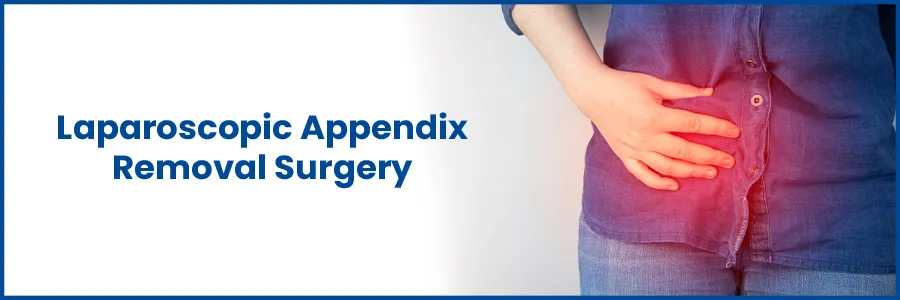Categories
- Cardiology 84
- Dermatology 45
- Endocrinology 33
- ENT 16
- Fertility 190
- Gastroenterology 78
- General-Medicine 81
- Gynecology 80
- Hematology 19
- Infectious-Diseases 33
- Neurology 52
- Oncology 34
- Ophthalmology 23
- Orthopedics 69
- Pediatrics 31
- Procedure 23
- Public-Health 144
- Pulmonology 59
- Radiology 8
- Urology 68
- Wellness 161
- Woman-and-child 77

5 Things to know Before Laparoscopic Appendix Surgery
Appendix removal surgery, also known as appendectomy, is a common procedure performed to treat inflammation of the appendix, a small pouch located at the junction of the small and large intestines.
While traditional open surgery was once the norm for appendix removal, laparoscopic appendix surgery has emerged as a less invasive and more preferred option.
In this guide, we'll delve into the details of laparoscopic appendix removal surgery, its benefits, procedure, and recovery.
Secure your health with a second opinion. Make informed decisions and book your appointment today!
Get A Second OpinionBenefits of Laparoscopic Appendix Removal Surgery:
Laparoscopic appendix removal surgery offers several advantages over traditional open surgery:
- Minimal Scarring: Laparoscopic surgery involves small incisions, resulting in minimal scarring and improved cosmetic outcomes.
- Less Pain: Smaller incisions mean less tissue trauma and reduced postoperative pain.
- Faster Recovery: Patients usually experience a quicker recovery time compared to open surgery, allowing them to resume their normal activities sooner.
- Shorter Hospital Stay: Laparoscopic procedures typically require a shorter hospital stay, contributing to cost savings and convenience.
The Laparoscopic Appendix Removal Procedure
Laparoscopic appendix surgery involves the following steps:
- Anesthesia: The patient is administered general anesthesia, ensuring they remain comfortably asleep throughout the surgery.
- Small Incisions: The surgeon makes a few small incisions near the appendix site to insert specialized instruments and a laparoscope (a thin, flexible tube with a camera).
- Visualization: The laparoscope transmits images of the abdominal cavity to a monitor, allowing the surgeon to view the internal structures in real-time.
- Appendix Removal: Using the instruments, the surgeon carefully detaches and removes the inflamed appendix. Closure: After the appendix is removed, the incisions are closed using sutures or surgical glue.
Recovery Time and Aftercare
Recovery after laparoscopic appendix removal surgery is generally quicker compared to open surgery. Here are some post-surgery guidelines:
- Hospital Stay: Most patients can expect to be discharged within 24 to 48 hours after surgery.
- Pain Management: Over-the-counter pain medications or prescribed pain relievers can help manage discomfort.
- Activity Resumption: Patients are encouraged to gradually resume normal activities, avoiding heavy lifting or strenuous exercise for a few weeks.
- Diet: Initially, a light diet is recommended, with the gradual reintroduction of regular foods as tolerated.
- Follow-up: Regular follow-up appointments with the surgeon are crucial to monitor healing and address any concerns.
Ready to take control of your health journey? Book your appointment now and start your path towards wellness today!
Book an AppointmentAppendix Laparoscopic Surgery Cost in India
- The cost of appendix laparoscopic surgery in India is relatively affordable compared to many other countries.
- On average, the surgery costs between ₹50,000 and ₹1,50,000, depending on the hospital, surgeon's expertise, and location.
- This estimate usually includes pre-operative tests, surgeon's fees, anesthesia, and post-operative care.
- Many insurance policies in India cover the cost of this procedure, either partially or fully.
- It's advisable to compare prices across different hospitals and consult with your healthcare provider to get the best care at a reasonable cost.
Potential Complications
Laparoscopic appendix removal surgery is generally safe, but like any surgical procedure, it carries some risks, including infection, bleeding, damage to surrounding organs, or conversion to open surgery if complications arise.
Conclusion:
- Laparoscopic appendix removal surgery is a minimally invasive approach that offers faster recovery, less pain, and minimal scarring compared to traditional open surgery.
- While it's generally considered safe and effective, it's essential to discuss the procedure, its benefits, and potential risks with a qualified surgeon.
- If you or a loved one is facing the need for appendix removal, consult with a healthcare professional to determine the best approach for your individual circumstances.
Frequently Asked Questions
Laparoscopic appendix removal surgery, also known as laparoscopic appendectomy, is a minimally invasive procedure performed to remove an inflamed or infected appendix through small incisions using specialized instruments and a laparoscope.
In laparoscopic surgery, small incisions are made for the insertion of instruments and a camera, resulting in less scarring, reduced pain, faster recovery, and a shorter hospital stay compared to open surgery with a larger incision.
The benefits include minimal scarring, less postoperative pain, faster recovery, shorter hospital stays, and quicker resumption of normal activities compared to traditional open surgery.
Candidates for laparoscopic surgery are typically individuals with uncomplicated appendicitis, where the inflammation is localized. Complex cases or cases with advanced infection may require open surgery.
The surgeon makes small incisions, inserts a laparoscope and specialized instruments, detaches and removes the inflamed appendix, and then closes the incisions using sutures or surgical glue.
The duration of the surgery varies but generally takes around 30 minutes to an hour, depending on the complexity of the case.

Categories
- Cardiology 84
- Dermatology 45
- Endocrinology 33
- ENT 16
- Fertility 190
- Gastroenterology 78
- General-Medicine 81
- General 6
- Gynecology 80
- Hematology 19
- Infectious-Diseases 33
- Neurology 52
- Oncology 34
- Ophthalmology 23
- Orthopedics 69
- Pediatrics 31
- Procedure 23
- Public-Health 144
- Pulmonology 59
- Radiology 8
- Urology 68
- Wellness 161
- Woman-and-child 77